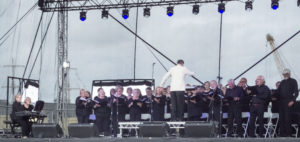Our thanks to Philip Sanderson for allowing the publication of this crit of our concert on Saturday March 24th 2018, which was prepared for publication in the Sunderland Echo :
“Sunderland Minster was energised by being full of eager music lovers as this evening’s concert, given by Bishopwearmouth Choral Society, consisted of two important French choral works of the 20th century: the haunting and evocative Requiem by Maurice Durufle and Francis Poulenc’s joyous and exuberant Gloria. Both of these works, in their own individual way, presented the performers with considerable challenges which, under the assured direction of their inspirational conductor David Murray, were met with confidence and magnificent aplomb.
The Durufle Requiem is a work full of unusual and complex sonorities and the most sumptuous and, at times, obscure harmonic writing. It also consists of many changes of metre. Durufle’s Requiem has a subtlety and elusiveness which, combined with moments of great dramatic intensity, requires a finely attuned musical ear to achieve real tonal balance and symmetry. Murray’s exceptional musicianship enabled his performers to create moments of both splendour and pathos in equal proportions.
The choir were in their usual fine form. In the big climactic moments the singing was full-bodied and carried with ease over the emphatic orchestral textures. Particularly effective, however, were the Gregorian chant-like sections where the singing was in unison and often very lightly accompanied. Here Murray coaxed some really lovely singing from his choir, showing meticulous attention to tonal quality, blend and clarity of diction. And complex contrapuntal textures, as exemplified in the Kyrie, were always clearly defined.
The Domine Jesu Christe features many contrasts of mood and texture, starting with the eerie spookiness of the orchestral introduction. At the heart of this movement the writing for full orchestra and choir is dramatic, with constant changes of metre and key. This was performed with thrilling intensity and was the perfect contrast to the quieter sections which preceded and followed it, highlighting the warm lyricism of the altos and the pearlescent tone quality of the sopranos. Richard Goodings delivered his solos with confidence and assurance, showing real musicianship. And, again, Murray’s direction delivered an acute awareness of the essence of this music.
The strings were shown off to beautiful effect in the Sanctus where their lovely rippling accompaniment created a wonderful cushion of sound to support the choir.
The central core of the Requiem is the hauntingly exquisite Pie Jesu for mezzo soprano solo. Here the warmth and commitment of Isobel Chesman’s singing was beautifully underpinned by the nuanced and expressive solo cello of Andy Wardale.
The Lux Aeterna was hushed and fervent, followed by the Libera Me where after a sustained opening the music grew in intensity, leading to dramatic and exciting utterances of Dies Irae, Dies Illa, before the music subsided once again at the end. The Requiem concluded with an ethereal and delicate setting of In Paradisum. The opening section was sung by the sopranos with limpid purity of tone. They were joined by the full choir who sang with control, beautiful phrasing and unanimity of tone colour. This was a moving and reverent ending to a fine performance of a challenging work that can quite often go wrong. But here it certainly did not: every person involved should be proud of themselves.
Poulenc’s Gloria offers very different musical fare. It is full of strong musical contrasts typical of Poulenc’s style, where rhythmic vitality and élan combine with sumptuous lyricism and wide-ranging dynamics. There was certainly no anti-climax here with respect to Murray’s leadership of his combined forces in an idiomatic, stylistically authentic performance, which displayed to the full all the exuberance, beauty and idiosyncratic quirkiness of this exciting music.
The six movements, though relatively short, contain a variety of styles and textures. The majestic opening of the Gloria introduced a rhythmic movement sung with vibrant confidence by the choir. The buoyant Laudamus Te was full of joyous interplay between sopranos and tenors and altos and basses, where the singing was confident and the text clearly projected. The gently expressive Domine Deus gives us Poulenc at his most lyrical. Here a delicate orchestral introduction set the scene beautifully for the sweet-toned soprano of Rosanna Wickes who had stepped into the breach at the last moment due to the indisposition of the original soloist. She sang with exquisite purity of tone, controlled phrasing, and was accompanied by choir and orchestra with true sensitivity. The serene mood of this music was in sharp contrast to that of the Domine Fili Unigenite where the bright and breezy orchestral playing was perfectly matched by the vigour and drive of the choral singing.
The Domine Deus Agnus Dei brought us back once again into the serene lyricism of Poulenc’s sound world. The atmospheric orchestral opening, slow and harmonically ambiguous, was followed by a poignant melody in which the solo soprano soared effortlessly above the combined accompaniment of choir and orchestra. In the final Qui Sedes the majestic opening contrasted with the lively rhythm of the following section. This is Poulenc at his most energetic and animated and both choir and orchestra revelled in the buoyancy and driving rhythms of the music. The final section achieved a real sense of stillness, combining beautifully mellifluous orchestral playing with sustained and even-toned singing from choir and soloist to bring the work to a tranquil close.
The performers are to be congratulated on providing an appreciative audience with an evening of high-quality sophisticated music making from a fine choir, excellent soloists and orchestra and a superb musical director.
It’s not so long ago that Sunderland put in a bid for City of Culture status. Sadly this excellent bid was unsuccessful but the impetus of that process has led to the development of a number of plans and strategies to raise the cultural profile of the city. Culture means many things to many people, but this evening’s commendable performance surely is a clear indicator that culture is alive and well in the City of Sunderland. Some may say that classical music is rather niche. That is up for debate but it is nevertheless important that the cultural regeneration of this city encompasses all creative and artistic endeavours across all genres. I’m sure someone in a cultural role has attended a Bishopwearmouth Choral Society Concert. If not, then perhaps, Bishopwearmouth Choral Society, could invite them to your next wonderful evening of music making to share what a treasure Sunderland has in its midst.”
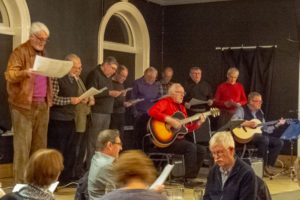 As their contribution to our 70th Anniversary season, the Tenors organised a musically themed social evening in The Peacock in Sunderland on Friday 1st March 2019. In a comfortable setting the expectant audience of choir members, family, and friends were treated to a show that they knew had been prepared with considerable effort.
As their contribution to our 70th Anniversary season, the Tenors organised a musically themed social evening in The Peacock in Sunderland on Friday 1st March 2019. In a comfortable setting the expectant audience of choir members, family, and friends were treated to a show that they knew had been prepared with considerable effort.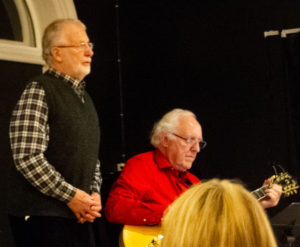 ‘Peggy Sue’, through a ‘Hard Day’s Night’ and ‘Ticket to Ride’ until they left singing ‘Always Look on the Bright Side of Life’.
‘Peggy Sue’, through a ‘Hard Day’s Night’ and ‘Ticket to Ride’ until they left singing ‘Always Look on the Bright Side of Life’.



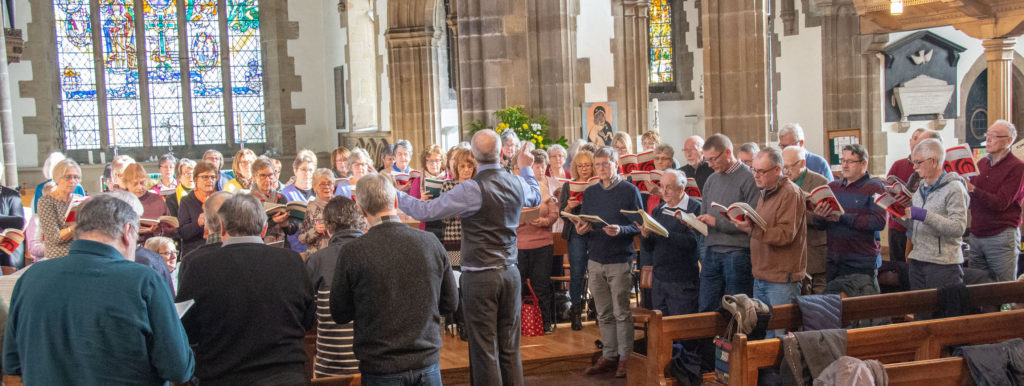
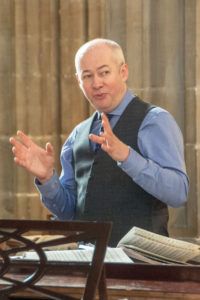 The day was led very enthusiastically by Aidan Oliver, one of the UK’s leading choir directors, whose activities encompass the full range of symphonic, operatic, liturgical and contemporary music. He is the founding director of Philharmonia Voices, the professional choir which collaborates with the Philharmonia Orchestra on many of its most ambitious projects, while as guest chorus master he has worked with some of the UK’s leading choirs including the BBC Symphony Chorus, BBC Singers, Huddersfield Choral Society and the Chorus of English National Opera.He is currently the director of Dulwich Choral Society and Director of Music at St Margaret’s Church, Westminster Abbey, as well as Associate Conductor of the St Endellion Festival in Cornwall. He was recently appointed the new director of the Edinburgh Festival Chorus.
The day was led very enthusiastically by Aidan Oliver, one of the UK’s leading choir directors, whose activities encompass the full range of symphonic, operatic, liturgical and contemporary music. He is the founding director of Philharmonia Voices, the professional choir which collaborates with the Philharmonia Orchestra on many of its most ambitious projects, while as guest chorus master he has worked with some of the UK’s leading choirs including the BBC Symphony Chorus, BBC Singers, Huddersfield Choral Society and the Chorus of English National Opera.He is currently the director of Dulwich Choral Society and Director of Music at St Margaret’s Church, Westminster Abbey, as well as Associate Conductor of the St Endellion Festival in Cornwall. He was recently appointed the new director of the Edinburgh Festival Chorus.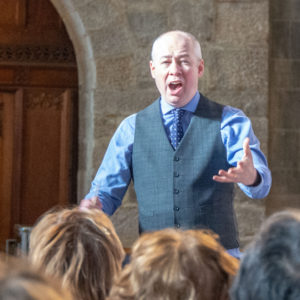
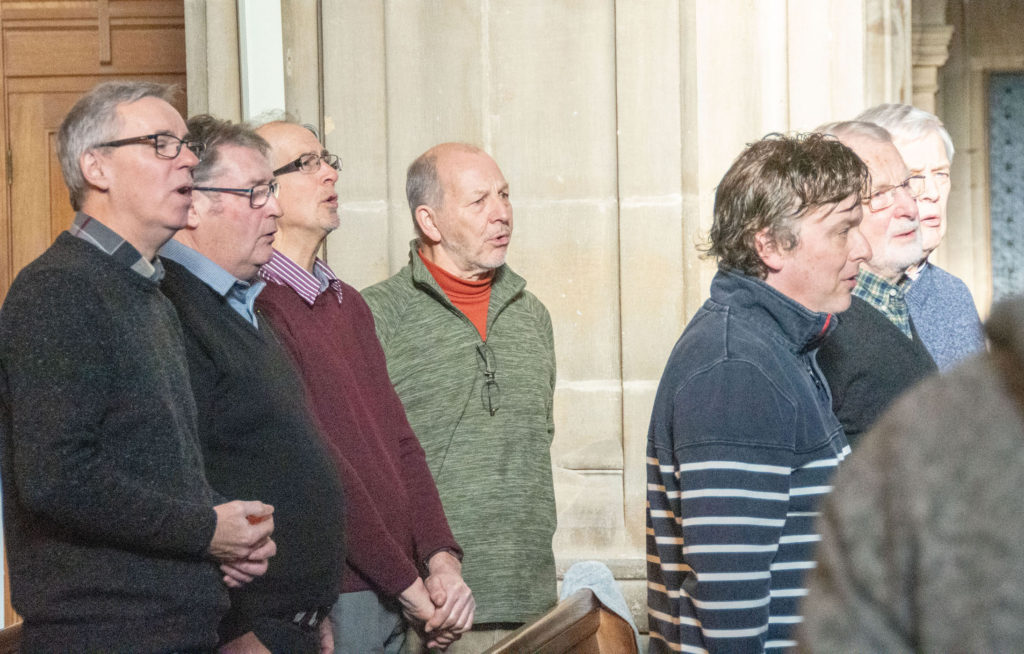
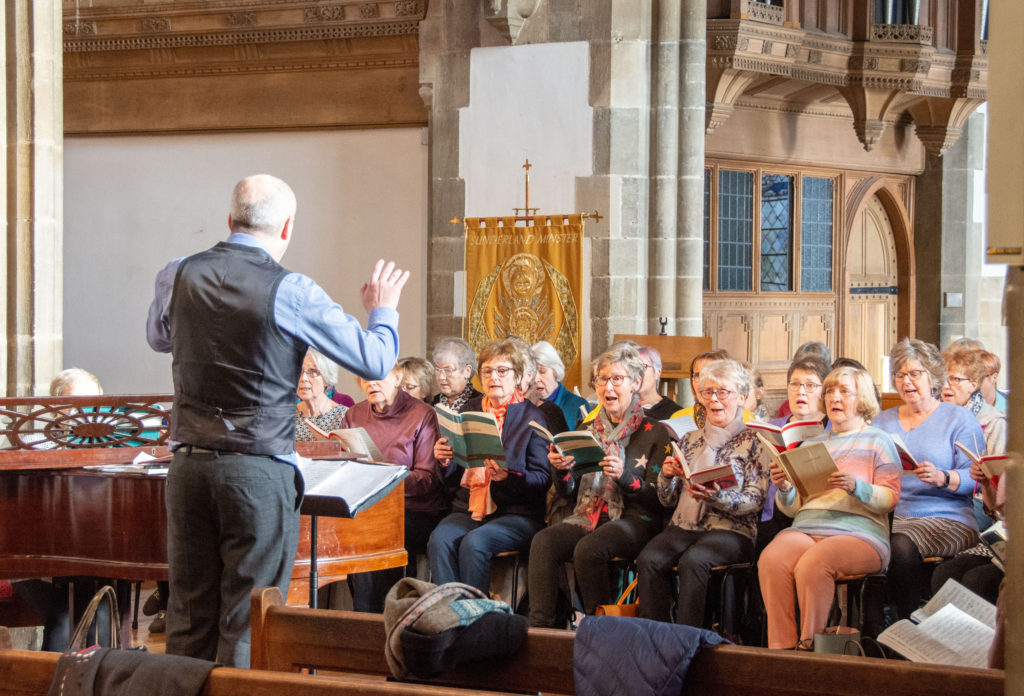
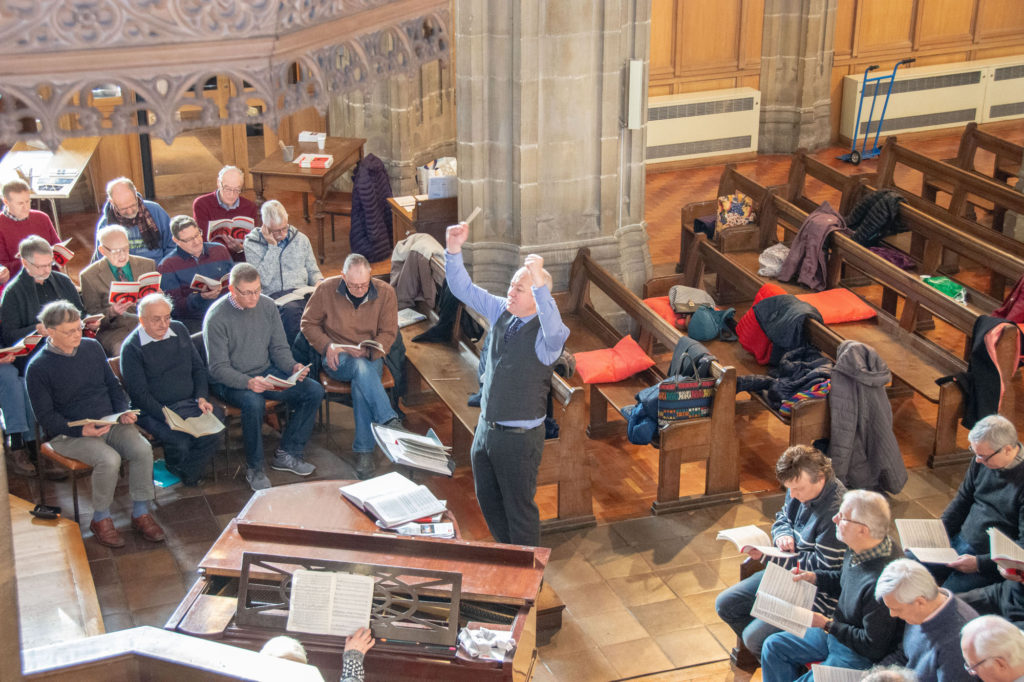
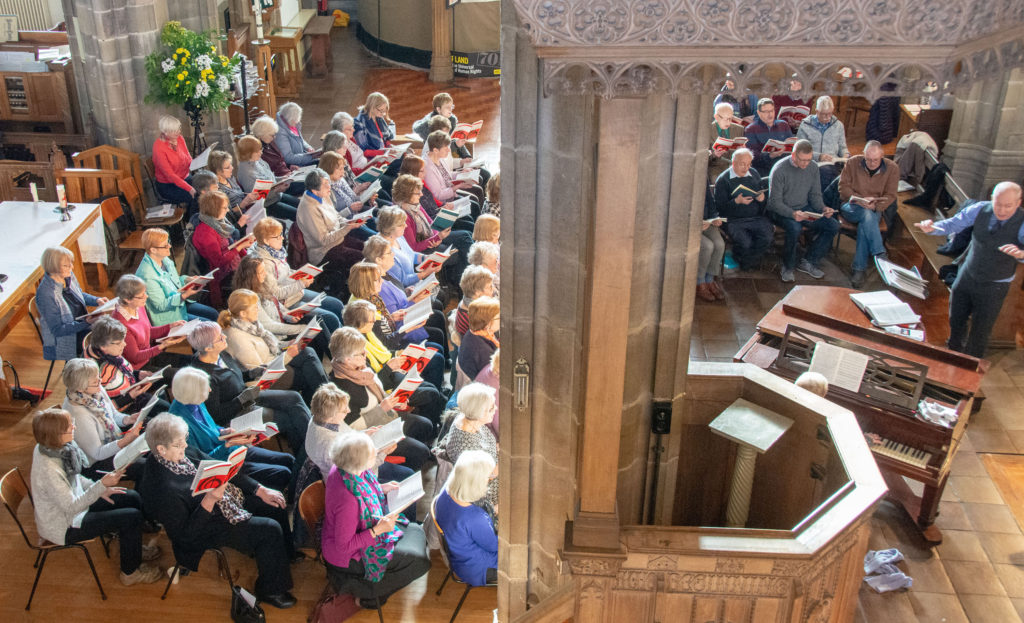
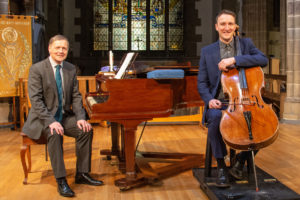 It was a fortunate audience, on Saturday 19th January, who were treated to a concert by this father and son duo who need no introduction to the Society. David Murray is Bishopwearmouth Choral Society’s Musical Director and one of the North East’s best known pianists, having accompanied many well known names and playing on notable occasions. However this was a much more significant event as his son, Christopher, returned to the North East to play alongside him. Christopher is a member of the dynamic and charismatic Heath Quartet – winners of many prestigious awards – and is now earning himself a well deserved reputation on the national and international stage.
It was a fortunate audience, on Saturday 19th January, who were treated to a concert by this father and son duo who need no introduction to the Society. David Murray is Bishopwearmouth Choral Society’s Musical Director and one of the North East’s best known pianists, having accompanied many well known names and playing on notable occasions. However this was a much more significant event as his son, Christopher, returned to the North East to play alongside him. Christopher is a member of the dynamic and charismatic Heath Quartet – winners of many prestigious awards – and is now earning himself a well deserved reputation on the national and international stage.